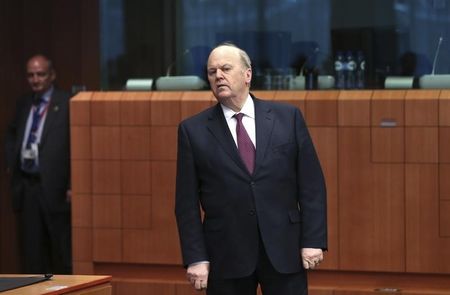By Padraic Halpin
DUBLIN (Reuters) - Ireland's budget deficit is set to fall to 4 percent of GDP this year thanks to an economic recovery that may also eliminate the need for Europe to ease the burden of the country's bank debt, Finance Minister Michael Noonan said on Wednesday.
A sharp rise in Dublin's tax take and in economic activity so far this year will see Ireland better its deficit target of 4.8 percent of gross domestic product (GDP) for 2014 and close in on the EU target of 3 percent by the end of 2015.
Noonan said on Tuesday that far fewer spending cuts and tax hikes would be needed in the last in a long line of austerity budgets next month after the government collected 1 billion euros ($1.3 billion) or over 4 percent more tax than expected in the first eight months of the year.
"I don't think I'll have to increase taxes very much in the budget or (spending minister) Brendan Howlin won't have to cut expenditure very much further," Noonan told national broadcaster RTE.
"Because we're not spending the extra tax that's come in, the 4.8 (percent deficit) by the end of the year will be around 4 (percent) so we're halfway there and of course the base for taxation will go up next year as well."
The government has said it wants to offer low and middle-income workers a tax break in October's budget and Noonan said that he may have to raise taxes elsewhere in order to fund tax reliefs and make the required adjustment.
Noonan added that he would use next month's budget speech to outline plans for the following year's budget as well as offering a roadmap for what the government would do for the next three or four years if re-elected in 18 months time.
He cautioned that the government could not risk the success that has seen unemployment fall below the euro zone, exports rebound and consumers begin to spend again by playing fast and loose and looking to win votes.
But he said there was no reason why the economy could not grow by 3 percent a year for the next decade, crediting a prudent fiscal policy that contrasted with Italy and France who he said were "floundering" because they chose a different path.
BANK DEBT
Noonan, who will meet European Union officials next week to seek their approval to refinance its bailout loans from the IMF, gave the first signal on Wednesday that the government was less concerned about pursuing its long-standing goal of having Europe retrospectively recapitalising its banks.
"If we were to give our bank shares to the European fund, they'd give us a lump of money to take off the debt. Now that's not as attractive a deal anymore because our bank shares have become very valuable," Noonan said.
"It will depend on the negotiating position but I'm coming around to the view that we will probably have a better option of selling AIB (Allied Irish Banks) over time to the market than using the money to reduce the debt and we'd probably get more out of it."
Ireland had described a pledge two years ago by euro zone leaders to allow rescue funds to directly recapitalise banks as a "game changer", as it sought to claw back some of the 64 billion euros it pumped into its stricken lenders.
However Ireland's two main banks, including 99-percent state owned AIB, have since returned to profit and demand for Irish assets has risen dramatically, prompting the change of course.
"Politically and most likely commercially, the easier and more attractive option now would appear to be to reprivatise AIB on the state's own terms and retain control over the disposal strategy," said Ciaran Callaghan, a banking analyst at Merrion Stockbrokers.

"The banking assets in Europe and particularly in Ireland have rebounded quite significantly from their lows. The actual quantum that the government could recoup from a sale or a partial disposal of AIB is likely to outweigh the price it could achieve from a sale to the ESM (Europe's bailout fund)."
(Editing by John Stonestreet)
2_800x533_L_1412520354.jpg)